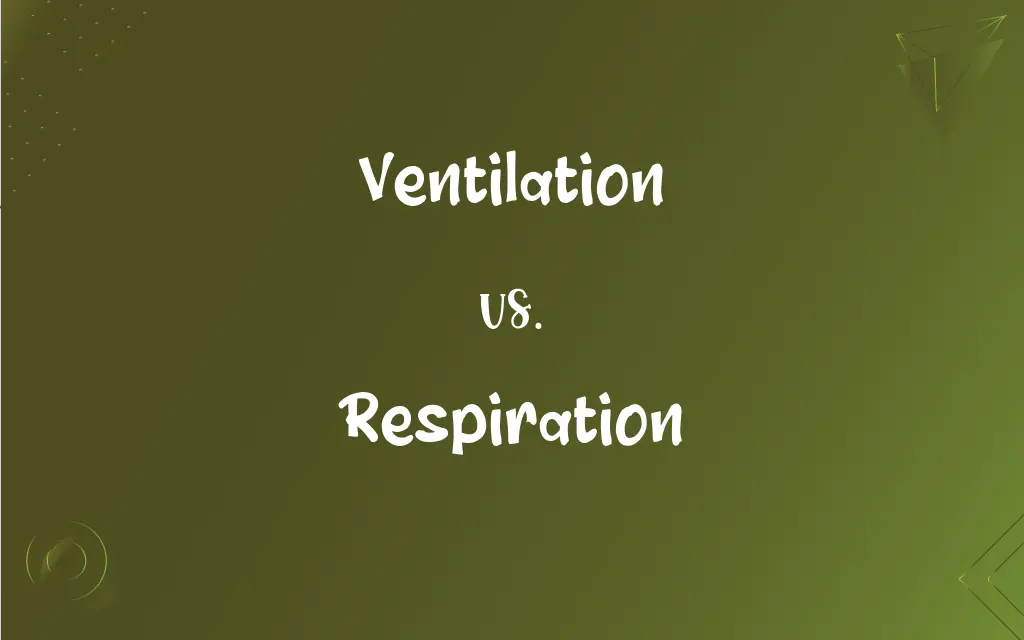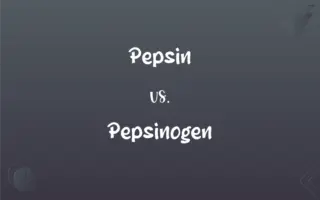Ventilation vs. Respiration: What's the Difference?
Edited by Harlon Moss || By Janet White || Published on December 16, 2023
Ventilation is the process of supplying fresh air to a space. Respiration is the biological process of inhaling oxygen and exhaling carbon dioxide.

Key Differences
Ventilation refers to the mechanical or natural process of introducing fresh air into and circulating it within a space, important for ensuring air quality. Respiration, in contrast, is a biological process where organisms inhale oxygen and exhale carbon dioxide, crucial for cellular metabolism.
Ventilation is primarily concerned with maintaining air quality and temperature control in environments like buildings, while respiration is a vital physiological process in living organisms for energy production.
Ventilation can be controlled using systems like fans and air ducts in buildings to manage airflow, playing a key role in comfort and health. Respiration, on the other hand, occurs at a cellular level, where oxygen is used to produce energy, and carbon dioxide is a waste product.
In the context of health and safety, effective ventilation is essential to prevent the buildup of pollutants, whereas effective respiration is crucial for maintaining the health and functioning of an organism's body.
Technologically, ventilation involves engineering solutions like HVAC systems in buildings, whereas respiration is studied in fields like biology and medicine, focusing on the function of the lungs and cellular metabolism.
ADVERTISEMENT
Comparison Chart
Primary Function
Air exchange in spaces for quality and temperature
Biological process of gas exchange in organisms
Concern
Air quality, temperature control
Oxygen intake, carbon dioxide expulsion
Systems Involved
Mechanical systems like HVAC, natural airflow
Biological systems like lungs and cells
Field of Study
Engineering, building design
Biology, medicine
Importance
Prevents pollutant buildup, maintains comfort
Essential for cellular metabolism, organism survival
ADVERTISEMENT
Ventilation and Respiration Definitions
Ventilation
A system designed to bring outside air into and distribute it within a building.
The building's ventilation system was upgraded to improve air quality.
Respiration
The mechanism by which cells break down food to release energy.
Plants undergo respiration at night, absorbing oxygen and releasing carbon dioxide.
Ventilation
The creation of a flow of air in a specific space for health and safety reasons.
Good ventilation in the kitchen is necessary to remove cooking fumes.
Respiration
The biological process of inhaling oxygen and exhaling carbon dioxide.
During intense exercise, the body's respiration rate increases significantly.
Ventilation
The process of supplying and circulating fresh air in a space.
Proper ventilation in the office ensures a comfortable working environment.
Respiration
Involves the lungs in humans, exchanging gases with the bloodstream.
He studied how respiration is affected in high altitude conditions.
Ventilation
The act of providing fresh air and removing stale air from an enclosed area.
Ventilation is crucial in underground tunnels to prevent air stagnation.
Respiration
A physiological process crucial for energy production in living organisms.
Cellular respiration is essential for converting glucose into usable energy.
Ventilation
The technical means or systems used to control indoor air quality.
They installed advanced ventilation in the laboratory to handle airborne chemicals.
Respiration
The act of breathing, fundamental to the survival of most organisms.
Meditation techniques often focus on controlling respiration.
Ventilation
The replacement of stale or noxious air with fresh air.
Respiration
The action or process of inhaling and exhaling; breathing. Also called ventilation.
Ventilation
The mechanical system or equipment used to circulate air or to replace stale air with fresh air.
Respiration
An act of inhaling and exhaling; a breath.
FAQs
What is respiration?
The biological process of gas exchange in living organisms.
Can poor ventilation affect health?
Yes, it can lead to issues like respiratory problems and fatigue.
Why is ventilation important in buildings?
To maintain air quality and remove pollutants.
What is ventilation?
Introducing fresh air into a space and circulating it.
What happens during cellular respiration?
Cells use oxygen to produce energy and release carbon dioxide.
Is ventilation only important for indoor spaces?
Primarily, though it can also refer to air movement in vehicles or other enclosed spaces.
What are common types of ventilation systems?
Natural ventilation, HVAC systems, and exhaust fans.
What is the role of ventilation in fire safety?
To remove smoke and toxic gases, improving evacuation and firefighting efforts.
Is respiration the same as breathing?
Breathing is part of respiration, but respiration also includes cellular processes.
How does respiration affect physical activity?
It increases to supply more oxygen during intense activities.
Do plants undergo respiration?
Yes, they respire, especially at night, using oxygen and releasing carbon dioxide.
Does respiration vary among different organisms?
Yes, it varies significantly among different species and plant life.
How is respiration controlled in the body?
Through the respiratory center in the brain and feedback from blood gas levels.
Can ventilation help in preventing disease spread?
Yes, particularly airborne diseases by reducing the concentration of pathogens.
Can respiration rate indicate health issues?
Yes, abnormal respiration rates can signal health problems.
What is mechanical ventilation?
Ventilation using powered systems like fans and air handlers.
Can ventilation systems filter out pollutants?
Many systems include filters to reduce indoor air pollutants.
How does weather affect building ventilation?
It can impact the effectiveness of natural ventilation systems.
Does altitude affect respiration?
Yes, higher altitudes can challenge the body's ability to respire effectively.
What is anaerobic respiration?
Respiration that occurs without oxygen, often in certain bacteria and muscle cells during intense exercise.
About Author
Written by
Janet WhiteJanet White has been an esteemed writer and blogger for Difference Wiki. Holding a Master's degree in Science and Medical Journalism from the prestigious Boston University, she has consistently demonstrated her expertise and passion for her field. When she's not immersed in her work, Janet relishes her time exercising, delving into a good book, and cherishing moments with friends and family.
Edited by
Harlon MossHarlon is a seasoned quality moderator and accomplished content writer for Difference Wiki. An alumnus of the prestigious University of California, he earned his degree in Computer Science. Leveraging his academic background, Harlon brings a meticulous and informed perspective to his work, ensuring content accuracy and excellence.































































